Understanding Casino House Edge
Casino house edge is the ratio that represents the casino’s advantage when you place a wager. Understanding the principles of the casino house edge is essential for anyone aiming to be a more successful gambler.
Often shown as a percentage, house edge is how the house is sure to make a profit from a game in the long run. Every single game found on the casino floor comes with odds that favor the house, but there is variation in just how profitable they can be. This is because some games have a higher house edge than others, especially when you play low-probability bets.
Therefore, you should look to identify low house edge casino games, variants, and wagers that can help to improve your returns. By diminishing the percentage of a casino’s advantage, you can even enhance your prospects of making a profit at the casino.
What Is House Edge?
House edge is the average profit a casino can expect to eventually make from bets taken on a game. If the casino edge of a game is 2%, the house can theoretically expect to keep $2 from every $100 wagered. The other 98% is paid out to winners. Both figures represent an average figure worked out over thousands of bets.
There is no uniform house edge on all casino games. The figure varies according to the game you play as well as the specific bets you make. For example, the house edge on blackjack is 0.5% with proper play. However, some wagers in the game can push the house edge up to 7.5%. Some craps bets (like any 7) give the casino an advantage of over 16%; others come with fair odds of 0%.
The casino’s house edge can also depend on the variant of the game, which becomes apparent when you compare American and European roulette. Roulette is excellent for explaining house edge as it doesn’t have variables found in other casino games, such as the come-out roll in craps. A standard wager is also the final wager of a play, unlike blackjack or Caribbean poker.
Here is a comparison of American and European roulette odds. You can see the house edge raised by the inclusion of the double zero. The odds are also affected.
| Bet | Payout | American Odds | American House Edge | European Odds | European House Edge |
| Straight | 35:1 | 2.63% | 5.26% | 2.70% | 2.70% |
| Split | 17:1 | 5.26% | 5.26% | 5.41% | 2.70% |
| Red/Black | 1:1 | 47.37% | 5.26% | 48.65% | 2.70% |
| Odd/Even | 1:1 | 47.37% | 5.26% | 48.65% | 2.70% |
| High/Low | 1:1 | 47.37% | 5.26% | 48.65% | 2.70% |
| Dozens | 2:1 | 31.58% | 5.26% | 32.43% | 2.70% |
| Columns | 2:1 | 31.58% | 5.26% | 32.43% | 2.70% |
| 6 Line | 5:1 | 15.79% | 5.26% | 16.22% | 2.70% |
| 5 Line | 6:1 | 13.16% | 7.89% | N/A | N/A |
| Square | 8:1 | 10.53% | 5.26% | 10.81% | 2.70% |
| Street | 11:1 | 7.89% | 5.26% | 8.11% | 2.70% |
An American roulette table has 38 numbers compared to 37 for the European variant. This is down to the addition of the double zero slot on the former.
Despite this, you may have noticed that the odds of winning a straight-up bet are almost the same (2.63% compared to 2.70%). Even when there is a greater chance of losing when playing on an American wheel. This is because adding that “00” slot increases the casino’s edge from 2.7% to 5.26% while still paying out at odds of 35:1.
You can cut the house edge considerably when opting to play European roulette (2.70%) over the American variant (5.26%). Of course, not all casinos in Las Vegas and beyond will have both wheels. But if available, almost every single-zero variant will present you with an advantage over double-zero tables. This includes French roulette, which also has a 2.70% house edge. It doesn’t completely cut out the casino’s advantage, of course.
To understand casino house edge, you must have a grasp of how odds and payouts work. The odds on a roulette table represent the probability of that bet winning but with the casino’s advantage factored in.
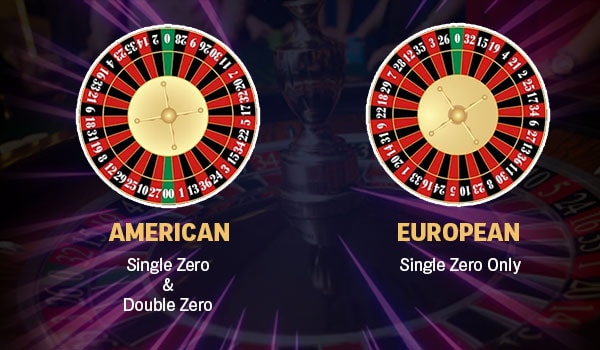
If there was no casino edge involved, you would be paid out at 36:1 in European roulette as there are 37 numbers in total. Furthermore, the presence of the zero or double zero would mean that your red or black win would be greater than 1:1 as the zeros are green. At least, your bet would result in a push for the ball landing in a non-red or black slot.
In considering this, it’s clear that American roulette represents worse value for money than its single zero equivalents. That stands true whether you are playing at the best online casinos or your local land-based gaming establishment.
Furthermore, American odds are lower than those at a European table because that extra space lowers your chances of winning. With two zero slots and 36 regular numbers, the odds are worked out as 2/38 = 5.26%. For single zero roulette, the house edge is worked out at 1/37 = 2.70%.
A win is paid out as a multiplication of the unit placed and is in line with your chances of winning. For instance, you will be paid out at 35x your stake for landing a single number, as there are 36 or 37 on the wheel. A winning red or black bet is paid at evens. Other than the zero or double zero, only two colors are covering the numbers on the wheel.
When House Edge Varies According to the Bet
Different games provide the house with varying levels of advantage over players but casinos always base it on perfect strategy. The same is true of bets within the game as well as different variants of the same game. For instance, you’ll find several differing pay tables when comparing video poker machines. Still, the house edge of a game can be affected by multiple factors rather than real-time statistics. For instance, you’ll find the house advantage on blackjack cited as 0.5%, which is not always the case. That percentage represents the expected edge a casino has over an experienced player using basic strategy. However, it does not take into account the insurance bet, which has a much higher house advantage of 5.8%. Here is a look at the typically highest and lowest house edges of some of the world’s most popular casino games.
| Game | Lowest House Edge | Highest House Edge |
| Blackjack | 0.5% | 7.5% |
| Baccarat | 1.01% | 15.75% |
| European Roulette | 2.70% | 2.70% |
| American Roulette | 5.26% | 7.89% |
| Video Poker | 0.46% | 6.55% |
| Craps | 0% | 16.67% |
| Keno | 20% | 40% |
| Three Card Poker | 3.37% | 7.28% |
| Backgammon | 4.82% | 6.39% |
| Slots | 1.89% | 25% |
Again, it’s crucial to understand that house edge can depend on the types of bets you opt for. It can also change if you decide to play at unfavorable tables or opt for variants that ultimately favor the casino. Whatever you do, the house will always base its edge on players doing things the right way instead of using isolated statistics from one or two sessions.
As such, one of the biggest mistakes a player can make is thinking that all video poker games come with a return to player (RTP) of 99.54%. Or that all craps bets pay out at fair odds and have no house edge.
This can lead to unnecessary losses by skewing the actual disadvantage they are hoping to overcome. Worse than that, it can create the false impression that the numbers don’t add up and that they have been “robbed.”
How to Calculate House Edge
As house edge is the ratio of the initial loss to the initial bet, we can often work it out. This involves isolating some information, including the probability of a win and the odds of a loss. Once we have ascertained both, we can use basic math to determine the house edge.
We used roulette in the previous example and will stick with it here. As you can see, working out the house edge on a European wheel involves knowing the range of potential wins as well as the payout for a win. For this example, we bet $1 per spin.
- The ball can only land on just one number in a game.
- There are 37 slots on the wheel which represents a 1/36 chance of winning.
- 35:1 is the payout for a straight-up win.
- This means the actual odds for a win are 35:1 (actual odds) and not 36:1 (true odds).
- The additional unit represents the casino’s advantage and is factored into the equation.
We can work out the casino house edge on a straight-up bet by using the following formula:
- 1 x 1/37 = 0.0270270 x 100 = 2.70270 (2.70%)
That’s pretty much the house edge explained on European roulette. A straight-up bet is paid at 35:1 rather than 36:1, despite the real odds representing the latter. The actual odds are determined once we factor the casino’s house edge into account. Casinos rely on this to guarantee a profit which helps to pay staff and overheads, as well as justify their business model.
Almost every single casino game has some kind of house edge built into the odds. Without it, a player would have a stronger chance of breaking even in the long run. Ergo, understanding the difference between real odds and actual odds is essential.
Real Odds vs. Actual Odds
A simple coin toss scenario is one of the easiest ways of illustrating true odds vs. actual odds and the subsequent house edge.
Let’s say you and a friend decide to play for a $1 stake per toss, with the winning player taking a dollar and the loser parting with one. When playing with a friend, there is no house edge. It is a 50/50 contest with true odds reflecting that.
The payout is one dollar per win. Starting with a net value of zero, you win the first two games which takes you to +$2 up. Losing the third game brings you to a net position of +$1.
| Coin Toss with a Friend | |||||
|---|---|---|---|---|---|
| Scenario | Odds | House Edge | Bet | Payout | Profit/Loss |
| Coin Toss 1 | 50/50 | Zero | $1 Heads (WIN) | $1 | +$1 |
| Coin Toss 2 | 50/50 | Zero | $1 Tails (WIN) | $1 | +$2 |
| Coin Toss 3 | 50/50 | Zero | $1 Heads (LOSE) | $0 | +$1 |
At a casino, things look different. This is because the house edge is factored into the payout odds. In this case, the odds are still 50/50 but a payout for a win is 95% rather than a dollar.
If they were true odds, it would be $1 every time. But as a casino must insulate itself against frequent losses, you can expect to be up against it every time you play. This doesn’t mean you cannot win, of course!
| Coin Toss at a Casino | |||||
|---|---|---|---|---|---|
| Scenario | Odds | House Edge | Bet | Payout | Profit/Loss |
| Coin Toss 1 | 50/50 | Zero | $1 Heads (WIN) | $0.95 | +$0.95 |
| Coin Toss 2 | 50/50 | Zero | $1 Tails (WIN) | $0.95 | +$1.90 |
| Coin Toss 3 | 50/50 | Zero | $1 Heads (LOSE) | $0 | +$0.90 |
In this hypothetical scenario, you have the exact same sequence of results. You start with a $1 bet to win $0.95 in profit before winning another $0.95 to take it to $1.90. A loss in the third game leaves you with a net total of +$0.90 in profit rather than $1 when playing against your friend. So, where has that 10c gone?
The answer is the casino. Because they only pay out at $0.95 against odds of 50/50, this means they stand to make $0.05 even when they lose. When worked out, this means you are playing against actual odds. This is how the house edge guarantees the casino makes a profit.
Wondering if there are casino games without a house edge? Well, there are, but they are difficult to find. You might have read or heard about low-denomination video poker titles with zero house edge. In fact, some Deuces Wild machines had a player edge of up to 0.7% when played with optimal strategy. These machines are extremely rare these days, however.
Poker variants like Texas hold‘em are contested between players and not the casino, so true poker games don’t have a house edge. Although the house does take a cut through what is known as “the rake.” This is their “tax” for allowing the game to take place inside their premises. Keep in mind that this does not apply to casino poker games, like Caribbean poker variants, where you compete against the dealer or a pay table instead of other players.
What Is RTP in Casino Games?
Return to player (RTP) represents the average payout of the money a gambling machine makes, which means it is sort of like the opposite of the house edge. The house edge predicts the casino’s return, while the RTP predicts the payout to players. Keep in mind that RTP is a theoretical figure that is, like house edge, more of an average than a precise number. RTP is also relevant to long-term plays and does not always reflect itself in short sessions.
You are more likely to see RTP associated with online slot machines. It is commonly discussed alongside house edge, although the way it is represented makes it look more like the expected player edge. For instance, some players will flock to machines with higher RTP percentages as this can indicate that they will pay out more than those with lower RTPs.
That is not always the case, of course. If a slot has an RTP of 96%, which is high, that doesn’t mean you will walk away with $96 for every $100 spent. On new machines, this figure has been worked out across hundreds of thousands of simulated spins.
Calculating the real RTP on machines that have been fully functional for some time will take real money wagers – including wins and losses – into account. The percentage is worked out as the gross total of cash taken divided by the total paid out.
Let’s have an example. A game takes $550,000 in wagers over a set amount of time. It pays out $506,000. We work out the RTP using the following formula:
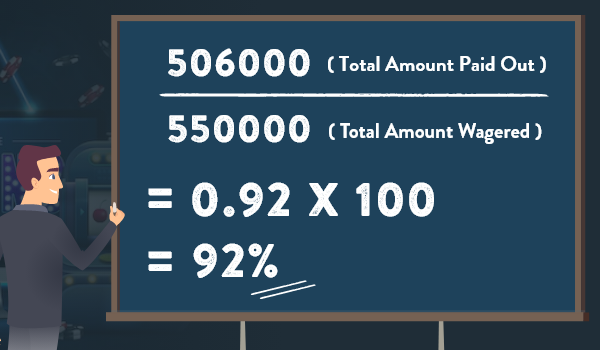
It is worth noting that the RTP of online slots are easier to find, as most casino software developers publish them. In land-based casinos, it can be tougher to get a true picture of the return to player numbers.
Some states in the US, such as New Mexico, require expected payouts to be printed on the front of slot machines. But for the most part, you will struggle to find these out when visiting a brick-and-mortar establishment in most regions around the world.
RTP is the balance of those plays and is meant more as a guide figure for what can be expected to be won over the long term. In the short term, slots enthusiasts use what is known as “variance” to determine the volatility of a game. For instance, low volatility means a lower risk and small, regular wins. High volatility comes with greater risk but larger, less frequent wins.
Casino Games with Best House Edge
Games like blackjack, craps, and baccarat are regarded as some of the lowest house edge casino games in the world. You can add roulette in there, too. Another thing these games have in common, however, is that they also have bets that come with very high odds.
Straight-up bets on roulette have odds of 2.63% on an American wheel. There is a reason for that, of course – your chances of hitting one number are very low. Compared with a game of blackjack, where the odds are 42.22% for a winning hand, you can see a major difference. And the payout reflects that.
It is very important to remember that odds, probability, and the house edge are different things. But they all matter when discussing casino games with the best odds. Some beginners may get confused by all the numbers and develop erroneous beliefs that harm their chances of winning. It’s always a good idea to focus first on the games with the best house edges, which can be viewed below.
- Baccarat – The banker bet in eight-deck baccarat (punto banco) has a house edge of 1.06%, making it an excellent wager. When asked to explain house edge, this game is often brought up as a positive example.
- Blackjack – In single-deck blackjack, the house edge is around 2% for an inexperienced player. This can be brought down to 0.5% by experienced players using tables that pay 3/2 and employing basic strategy.
- Craps – The don’t pass/don’t come bet comes with a casino house edge of just 1.36%, making it one of the best bets going. Any 7 has odds of 5:1 and a house advantage of 16.67%, however, and should always be avoided.
- Roulette – You can expect a house advantage of just 2.70% on European and French roulette. Although there are high odds for straight-up and multiple-number bets, red or black is much better at 48.65%.
- Video Poker – With perfect strategy, the RTP of full-pay Jacks or Better can be as high as 99.54% meaning just a 0.46% house edge. Video poker is also commonly brought up when discussing positive house edge on casino games.
Targeting casino games with the lowest house edge will help you limit your chances of losing. In many cases, it can also aid a winning run. But always ensure you are targeting bets with good odds, as well as variants that don’t affect either the house edge or the probability of wins.
For instance, blackjack tables that pay 6:5 should be shunned in favor of 3:2 tables. Furthermore, double exposure and multi-hand blackjack also have worse payouts, side bets, and other conditions that can affect the house edge. If you want to improve your chances of sustaining a long-term profit margin, take these things into account.
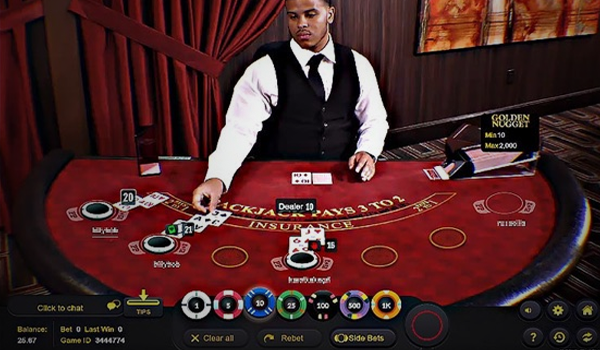
Another important thing to consider is where you play. Always look for safe online casinos that have their software checked by third parties to ensure its fairness. When gambling against the house, you must aim to improve your chances of success. This cannot be achieved when the tables are tilted.
Using Systems and Strategies to Lower House Edge
There are ways of lowering the house edge on casino games. One of the best ways of doing this is to have a strategy in place. While the word “strategy” implies some kind of esoteric knowledge, the ones that do work are not as complex as you might think.
Choosing the right games is a strategy. Instead of playing American roulette, you can opt for the European variant. Playing 3:2 blackjack means you’re playing against a theoretical house edge of 0.5% rather than as high as 2.4% with some 6:5 editions. If you can find 2:1, even better. But these are rarer than hen’s teeth.
Of course, there are some popular strategies and systems out there. These include but are not limited to, the following.
- The Fibonacci
- The Labouchere
- The D’Alembert
- The Contra D’Alembert
- The Paroli
- The 1-3-2-6
These systems do not consider the house advantage a casino has over you. Instead, they typically involve the adjustment of stakes depending on the results of previous bets. They can be used, in some cases, but you must understand they do not “bend the odds” in your favor or guarantee a profit. Some dispute these systems by introducing the concept of the gambler’s fallacy.
Aside from bankroll management and staking plans, the only real strategy you employ at a casino is the bets you choose within the games you play. Here are some examples of how to lower the house edge on popular games.
Blackjack
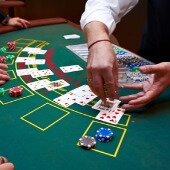
As previously mentioned, there are two main ways to lower the casino house edge in blackjack. The first is to find a 3:2 table, or better if that is possible. The second is to use basic blackjack strategy which will help you determine the best possible move from hands dealt.
Another thing that can help is to have a bankroll equivalent to that of 20x the table minimum. Although some players will play at least double that figure if their circumstances permit them to.
You can bookmark the following basic blackjack strategy resource, which comes with a chart. Most casinos allow charts but be sure to check this before taking it to the table. If you are playing online, just keep the chart open in another tab on your internet browser. Using strategy can lower the house edge to under 0.5% when no side bets are played.
Video Poker
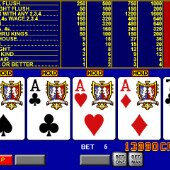
As with blackjack, using charts can help you lower the house edge by making optimal moves based on your hands. This applies to many card and table games, which can even include poker if you’re playing it online.
There are two other crucial things to remember when looking for the best shake in video poker. Ensure that you are playing the best tables you can find, which are usually Jacks or Better/Deuces Wild. Second, always bet max – unless the machine is configured to allow all hands on smaller stakes.
You can find our video poker guide, below. This will help you to choose the right bets from each hand dealt which can lower the casino’s house edge. In rare cases, you can even obtain a positive advantage.
Craps
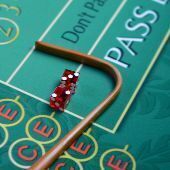
Unlike blackjack and video poker, craps is a dice game that has less of an element of skill to it. Therefore, there is no use for a strategy chart. However, there are ways of limiting the house edge. These can serve as strong examples of how attention can be rewarded.
In craps, there are bets to target and wagers to avoid. The same can be said for other games like baccarat or roulette. Craps holds the distinction of being one of the best casino games with the lowest house edge. But some bets also have excessive house advantages.
Knowing which bets to target will help you limit that house edge. The following guide explains what to look out for and how to potentially negate the advantage to fair odds.
Do Online Casinos Have a House Edge?
Yes. As profitable businesses, online casinos are also entitled to gain an advantage over the player. However, odds and payouts should be visible for the games you are playing online.
Different games come with different house edges. But the house edge of a particular bet will be the same regardless of how much you stake. For example, a straight bet on European roulette will be 2.70% whether you stake $1 or $100,000.
The house edge on casino games isn’t always readily available, however. Although the odds and payouts for games like blackjack, roulette, and video poker are usually printed on tables or even the front of machines.
One of the benefits of playing online is that you can find odds for bets on the screen. From here, you can work out the house edge yourself by using the formula we set out earlier. It’s much easier to work out a return to player (RTP) with stuff like Hot Drop Jackpot slots, or some video poker variants. You can even do a quick Google search to see if someone else has done the math for you.
As most land-based casinos don’t publish the RTP for slots, you might need to find this information elsewhere. Finding it may prove to be a challenge, as US gambling laws can vary from state to state. You may find some parts of the country, or perhaps the non-US nation you live in, may encourage transparency where this data is concerned. Others may not.
If playing online, it is essential to choose casinos that are safe and forthcoming.
How Do You Beat Casino House Edge?
Players can win money playing casino games but the house edge cannot be wiped out. If that were the case, casino owners would soon find their profit margins compromised. The house “always wins” because of its edge, regardless of how little. And that grows more prominent the longer you bet.
It is crucial to remember that house advantage is theoretical and doesn’t always even out. It is a statistical possibility that is worked out over myriad hands, spins, or rolls of the dice. You could walk into a casino, place $100 on a roulette number, and win. Then, you could collect your $3,500 in profit and walk straight out the door. This is not a scenario you will find very often, but it happens.
Instead, it’s more likely that players will place smaller stakes over a prolonged period where that house edge will eventually catch up with them. As many of us play games for fun, we will likely return to our favorite progressive jackpot slots or table games in search of a win. And we have a great chance of doing just that.
If there was no way to win money at a casino, they wouldn’t be around very long. There are several stories of players making millions and there are others that manage to make a living out of it. While these are certainly in the minority, the simple fact is you can win despite the house advantage.
Luck plays an integral part in winning. But so does the knowledge of the games you are playing and the right bets to choose. Without this, you are compromising your chances. Without sound bankroll management and even basic staking plans, luck may not be enough to save you. Especially in the long run.
 75%
75% 80%
80%

